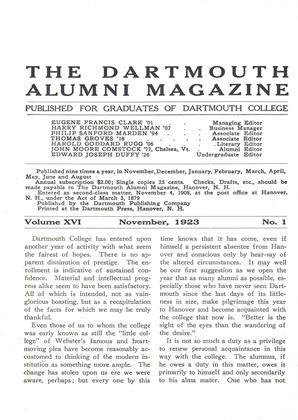(From the Washington Post)
The complexities of modern civilization, as well as the intricacies of the problems presented by up-to-date methods of education, are forcibly illustrated in the speech delivered by Dr. Hopkins, president of Dartmouth College, to the student body at the opening of that institution for the current academic year. His definition of the goal of education as the cultivation and development of our mental powers, to the end that we may know truth and conform to it, will be accepted as correct enough by those who have given the matter some thought. On the other hand, it must have appeared a hard and somewhat obscure and incomprehensible saying to the undergraduates to whom it was addressed. What is truth? was a question that puzzled Pilate and has puzzled uncounted millions before and since his time.
The distinction drawn by Dr. Hopkins between education and training has its roots deep in sound pedagogical principles, although it will make but scant appeal to a generation which in the main pursues knowledge not for its own sake or for the sake of the culture it confers or, in an altruistic sense, for the good it can do, but because it is a necessary handmaid in the house of life and fashions and sharpens the tools which must be used in carving out a career. There is, indeed, a brave attempt being made here and there by a few clear-sighted educators to lay emphasis on the advantage to be gained by stimulating the student's own thought and reasoning powers instead of encouraging him to accept the thought to reasoning of others. Voices crying in the wilderness, these exponents, of the true idea of education have not yet succeeded in attracting the attention which their doctrine deserves, and their utterances have been rather smothered amid the din raised by empiricists in pedagogy and four-flushers and bluffers in educational theory. But the seedling they are sowing will not ultimately perish. It will take root and flourish and will one day stand revealed as the tree of true knowledge, which will shelter all the land beneath its beneficent shade.
Addresses such as that delivered by Dr. Hopkins are not only enlightening in themselves, but they also serve as warnings against dangerous tendencies in teaching, against the shoals and quicksands of which it is the duty of the educator to steer clear. A few earnest men by banding their forces together can do much toward producing a thorough reform in our educational system and lifting it from the slough of despond into which many sympathetic but keen observers think it has unfortunately sunk.
 View Full Issue
View Full Issue
More From This Issue
-
 Article
ArticleTHE GOAL OF EDUCATION
November 1923 By ERNEST MARTIN HOPKINS -
 Article
ArticleDartmouth College has entered upon
November 1923 -
 Article
ArticleAFTER TEN YEARS
November 1923 By FRANK LATIMER JANEWAY -
 Class Notes
Class NotesCLASS OF 1910
November 1923 By Whitney H. Eastman -
 Class Notes
Class NotesCLASS OF 1903
November 1923 By Perley E. Whelden -
 Class Notes
Class NotesCLASS OF 1917
November 1923 By Ralph Sanborn







